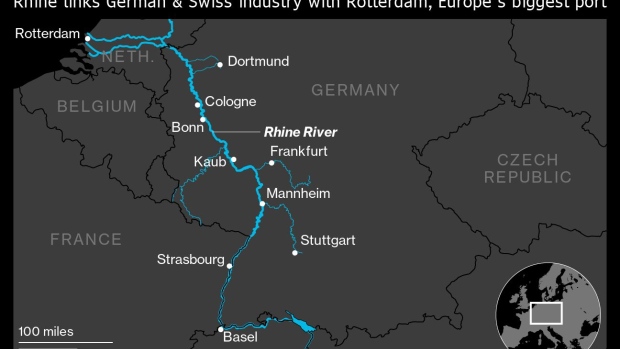Aug 11, 2022
What German Companies Are Doing About the Drying Up Rhine
, Bloomberg News

(Bloomberg) -- German companies are revising operations and looking for alternatives for transporting goods as low water levels on the Rhine upend logistics.
A key marker on the Rhine is set to drop to 33 centimeters (13 inches) by Aug. 15, according to data from the German Federal Waterways and Shipping Administration. Below the 40 centimeters mark, transporting goods along the river becomes unprofitable as barges need to carry less cargo to avoid running aground.
Finding other modes of transport is pushing up costs, according to EnBW AG, a utility that relies on the Rhine for its coal supply. The river is used for everything from chemicals to paper products, metals and grains.
Below is a compilation of comments this month from companies on how the low water level affects their businesses. It will be added to and updated as new information becomes available. This version updates BASF and Uniper and adds Grosskraftwerk Mannheim and Mainova
- BASF, chemicals
- Company can’t rule out reduction in production rate for individual plants in the coming weeks; no impact currently
- If levels at Kaub drop to 35cm-55cm in the next two weeks, some barges won’t be able to use the Rhine, while others would carry less cargo
- Company is already using rail more for goods
- BASF uses Rhine to transport 4.5 million tons of raw materials and products annually to and from its main site at Ludwigshafen
- Already operates a vessel that can carry up to 200 tons when the so-called Pegel water measure -- which is used to calculate draft -- is as low as 30 centimeters
- Two other barges that can operate at very low water levels are on order
- Has already expanded cooling plants which compensate for the lower volume of water that can be taken from the Rhine in dry periods
- Grosskraftwerk Mannheim, power producer
- Stockpiled coal is sufficient to continue power generation in coming weeks
- Mainova, utility
- Low water levels isn’t impacting supply chains yet because coal is exclusively delivered by train
- Uniper, power producer
- The company said Aug. 11 it won’t be able to being in enough coal via train to run its plants at full capacity for a longer period of time
- Previously warned of production cuts at Staudinger-5 plant into September due to lack of coal
- Company has limited volumes of coal on site and can’t easily get more
- Operations at that plant could be “irregular” into next month, it said in a filing
- EnBW, utility
- The cost of shipping coal is increasing and that is pushing up its operating costs
- Company has built up coal inventories
- Its plants on the Rhine and also the river Neckar both have rail connections
- RheinEnergie, utility
- Has always used rail for its Cologne-Merkenich lignite plant
- VTG, railcar operator
- War in Ukraine has pushed up demand for coal transportation, as industries work to cut natural gas consumption
- Already operating at full capacity, partly due to staff shortages
- Hoyer, truck operator
- Operating at full capacity
- Notes lack of truck drivers
- Evonik, chemicals
- Company has already chartered additional ships and trucks
- Currently there are no significant constraints to its supply chains
- Company says it is better prepared than in 2018
- Lanxess, chemicals
- Low water levels aren’t currently affecting logistics
- If Rhine water level drops further, company can switch to rail and road transportation
- Thyssenkrupp, steel
- Crisis team meets daily
- Uses ships with lower drafts to keep mill in Duisburg supplied
©2022 Bloomberg L.P.





